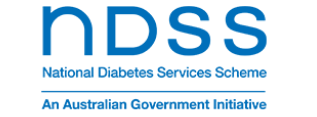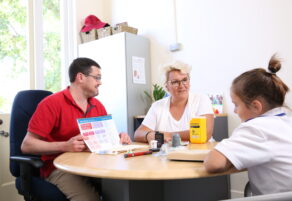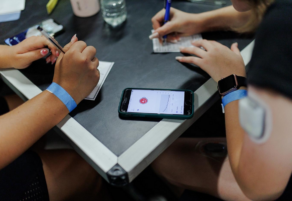Giving parents and carers support to help their children stay safe and healthy at school
All parents of young people with type 1 diabetes want their children to be safe, healthy and supported at school, and to be able to enjoy school like any other child.
The Diabetes in Schools program aims to give parents the peace of mind that their child’s type 1 diabetes can be well managed at school.
Tell your school about this program
Managing type 1 diabetes requires juggling many daily tasks. It’s normal for parents and carers of a child with type 1 diabetes to worry about their child managing the condition at school. Knowing that school staff have undergone training can make parents and carers feel more confident that their child will be supported at school.
The online learning and training provided through the Diabetes in Schools program is designed for school staff and covers the basics of type 1 diabetes, insulin and glucose monitoring, what to do during lows and highs, physical activity and even how to prepare for a school camp.

Role of parents and carers
Parents and carers have an important job to make sure the school is informed and kept up to date on their child’s type 1 diabetes management. They work with principals, designated school staff and health professionals to ensure that everyone involved knows what they have to do to keep their child or student healthy, safe and able to take part in all the opportunities of school life.

Parents and carers of young people with diabetes have the overall responsibility for their child’s health and wellbeing. They help make important decisions about their child’s health care and treatment, and advocate for their child’s best interests when working with other members of the school diabetes team.
Although parents and carers play an important role in terms of making decisions about their child’s diabetes, they should, alongside principals and school staff, involve the young person as much as possible in decisions about managing their diabetes at school. As young people mature, so too will their capacity to make decisions and their ability to self-manage their diabetes.
Parents and carers will work closely with designated staff to ensure that their child receives appropriate care and treatment for their diabetes.
>> Read More
A student’s diabetes management plan is an essential document that will guide how schools can support students to learn and participate fully in their school experience. The plan is also a critically important aspect of ensuring that a school complies with key legal obligations.
The diabetes management plan is usually be developed by the student’s diabetes treating team in collaboration with the student and family. A student’s diabetes management plan will outline their monitoring, insulin and daily diabetes management needs while at school. The plan should provide schools with clear information about when a student requires supervision or support with key tasks, such as checking their blood glucose or taking their insulin at school.
Parents or carers should work closely with the principal and school to determine how the school will support the student to effectively manage their diabetes. Upon school enrolment or at diagnosis, parents or carers should provide the school with the student’s diabetes management plan.
The diabetes management plan should be used to inform the types of supports the school may put in place to assist the student’s participation in school activities. These supports should be discussed and agreed upon by the principal, the student’s parents or carers, and student (where appropriate). Once these supports and reasonable adjustments are agreed, the school will implement the measures to support the student at school.
Parents or carers need to give appropriate consent to enable school staff to provide students with the support and assistance required to effectively implement the diabetes management plan. This consent gives authorisation for school staff, including the designated staff member, to provide the physical support necessary to carry out key tasks in supporting a student’s diabetes management. >> Read More
Reasonable adjustments are supportive actions that schools are required to make to support a student’s diabetes management so they may participate fully in school life and reach their full learning potential. Reasonable adjustments are often required to ensure that students with diabetes don’t miss out on opportunities at school. Schools have an obligation to agree upon these adjustments with a student’s parents or carers, and to implement them in a way that helps support the student’s needs as set out in the diabetes management plan. >> Read More
It is important that parents or carers and schools work together and agree on what diabetes support the student needs during school times. Often, the level of support that may be provided to help manage a young person’s diabetes at home cannot be reasonably provided in the school environment because of the responsibility that school staff have for all students under their care.
There may be times when the school and the parents have different ideas about the level of support needed in the school environment, or the adjustments that should be made. In some instances, it may not be possible for everyone to agree completely on this.
Issues can occasionally arise because of miscommunication between the school and the parent. If there is a disagreement that cannot be resolved between the child’s diabetes treating team, parents or carers, and the school’s leadership, it may need to be escalated to more formal mediation processes.
Most state and territory Departments of Education, Catholic Education Commissions and Independent school associations have formal processes to facilitate disagreements between parents and schools.
Scenarios
Find out how to navigate the challenges that
might arise for a child with type 1 diabetes.
Related resources
Checklists and guides are available to help parents and carers through whatever stage they’re at with a child’s type 1 diabetes diagnosis.








